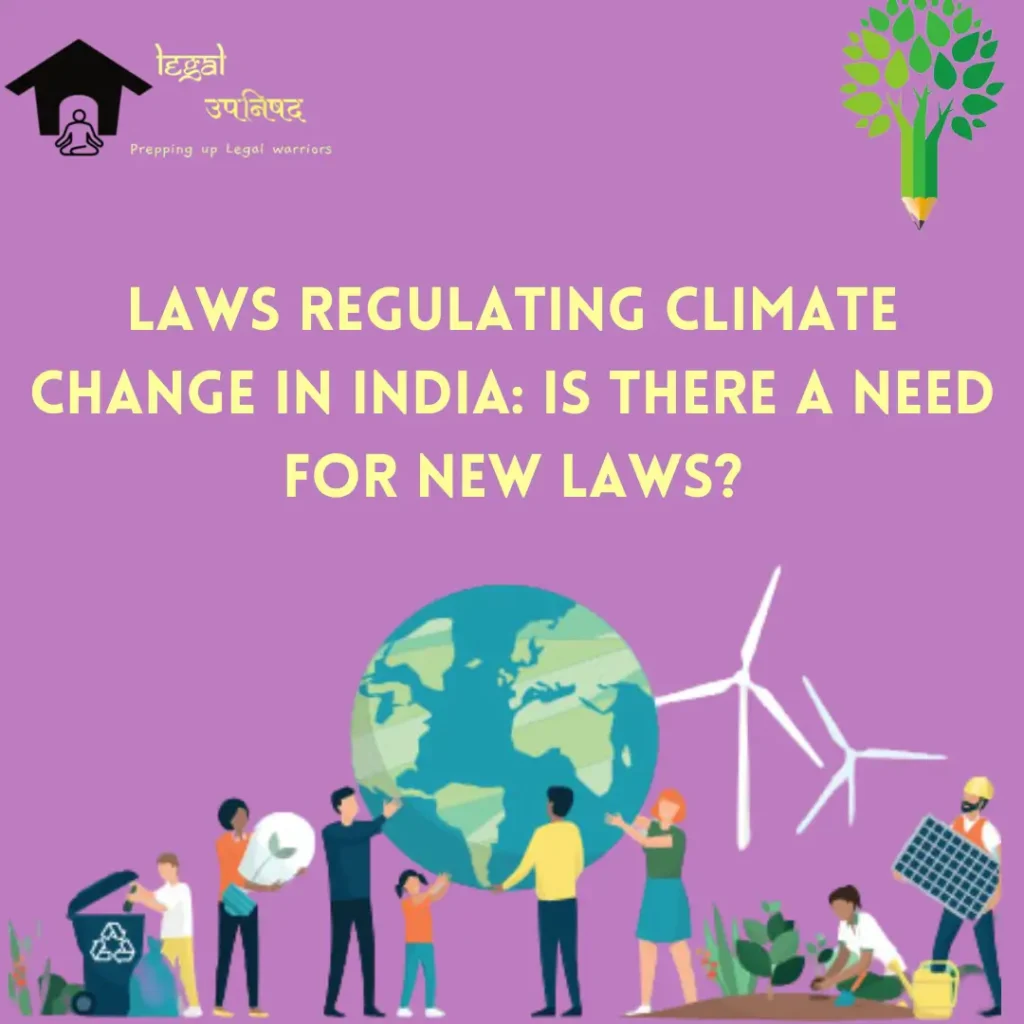This article on ‘Climate Change Laws in India and the Need for Change in 2022’ was written by an intern at Legal Upanishad.
(Apply for a law internship at Legal Upanishad)
Introduction
Climate change and global warming are one of the pressing matters in today’s world. There are many international and national agreements and laws that were formulated to slow the process of climate change that was occurring due to the increase in human activities. In this article, we will take a look at what is climate change and global warming and India’s stand on the same. Also, we will look at Climate Change Laws in India which relate to the protection of the environment and climate change and whether new Climate Change Laws in India are needed to protect the environment.
Climate Change and Global Warming
Climate change can be defined as the long-term change of temperature and typical weather patterns in a place. Some may consider this as simply a change in weather or climate and refuse to believe that climate change is even real. India is vulnerable to climate change as in recent years there has been an increase in cyclones, floods, etc., all of this can be linked to climate change. Around 20% of India’s GDP is dependent upon agriculture and its products and about 12% of India is prone to flooding and about 5,700 km of coastline is prone to cyclones and tsunamis.
Change in climate and global warming is one of the most serious challenges that mankind is facing and now has implications on human rights as well. The United Nations Human Right Council also observed that climate change posed an immediate and far-reaching threat to people around the world, hence violating the enjoyment of human rights. India is the 3rd largest emitter of greenhouse gases in the world just after the United States and China and we need to take some major actions to mitigate the effects of climate change.
India’s Climate Change Policy
There are Climate Change Laws in India that are put in place to mitigate and adapt to the changing climate and protect our environment. India is also a party to the Paris Agreement and the Kyoto Protocol which aims at reducing the emissions of carbon dioxide. India has two key Climate Change policies which are the National Action Plan on Climate Change (NAPCC) adopted on June 30, 2008, and its focus is more on domestic occupation as well as on promoting the understanding of climate change and also to adapt and mitigate the effects of climate change by being energy efficient and conserving natural resources.
The other document is India’s Intended Nationally Determined Commitments (INDC) in which India pledged a plan on reducing the intensity of climate change by adopting certain measures and it was submitted to the UN Framework Convention on Climate Change (UNFCCC) on October 2, 2015.
There are eight missions included in NAPCC:
- National Solar Mission
- National Water Mission
- National Mission for a Green India
- National Mission on Sustainable Habitat
- National Mission for Sustainable Agriculture
- National Mission for Enhanced Energy Efficiency
- National Mission on Strategic Knowledge for Climate Change
- National Mission for Sustaining the Himalayan Ecosystem
Other Legislations
The Constitution of India has some important provisions that deal with environmental protection and protect the same, thereby counteracting climate change. Some of the provisions are as follows:-
- Article 21 explicitly deals with the right to life and personal liberty but also implies the right of its citizens to a healthy environment,
- Article 48A empowers every state to protect and improve the environment at all costs,
- Article 51A states the duty of every citizen towards our natural environment.
Some of the important environmental laws in India are as follows:-
- The Wildlife (Protection) Act, 1972
- The Water Act, 1974
- The Forest (Conservation) Act, 1980
- The Air Act, 1981
- The Environment (Protection) Act, 1986
- The Motor Vehicles Act,1988
- Public Liability Insurance Act, 1991
- National Environment Tribunal Act, 1995


Is there a Need for Change?
There already are various Climate Change Laws in India and regulations that focus on protecting the environment and helping mitigate and adapt to the changing climate. What India lacks is in implementing those regulations properly through proper authority. There needs to be higher compensation to the individuals or corporations who violate these environmental laws.
Conclusion
Climate change is a natural process which has always been a part of the earth’s cycle and it is quite normal. What is not normal is the rate at which climate change is occurring in the 21st century. Due to industrialization and our dependence on energy sources mainly coal and oil, the rate at which climate change is occurring has increased significantly. Protection of the environment and climate change goes hand in hand. India has various environmental laws and if implemented properly, these regulations can be extremely helpful in reducing the rate of climate change if executed properly.
References
- India GDP sector-wise 2021 – StatisticsTimes.com. (2022). Retrieved 30 June 2022, from https://m.statisticstimes.com/economy/country/india-gdp-sectorwise.php
- Climate Change Laws in India (2022). Retrieved 30 June 2022, from https://www.mha.gov.in/MHA1/Par2017/pdfs/par2015-pdfs/ls-030315/1238.pdf
- India’s Climate Change Policy: Towards a Better Future. (2022). Retrieved 30 June 2022, from https://mea.gov.in/articles-in-indian-media.htm?dtl/32018/Indias_Climate_Change_Policy_Towards_a_Better_Future
